Musicianship Mastery with David Lane
Do you want to be a great musician? A well-rounded musician? Maybe you’re already a good musician, and you want to take that next step. To do that, you need to be able to sight-read well, play by ear, compose or improvise, understand the art of practice, and be versatile in many other ways. Musicianship Mastery (formerly known as The Musician Toolkit) explores these tools, how to improve them, and how you can apply them to a variety of gigs and musical careers whether you’re a professional musician or a committed artist who makes your income outside of music. Join us on a quest to improve your musicianship and to make you the most well-rounded musician you can be!
Episodes
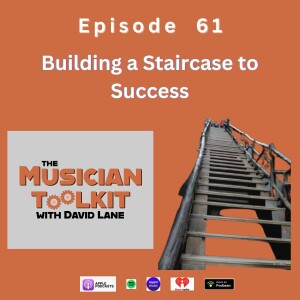
Monday Feb 12, 2024
Monday Feb 12, 2024
Whether it's composing a big piece, trying to master difficult repertoire, or wanting to build a full-time teaching studio when you don't even have your first student, it's easy to see the target far in the distance. Learning how to build and climb a staircase will help you accomplish absolutely any goal you have, big or small!
Previous episode referenced: Episode 40
Let me know your thoughts on this episode at https://www.speakpipe.com/MusicianToolkit or you can send me a written message at https://www.davidlanemusic.com/contact
You can find this episode and links to this show on all podcast apps from https://musiciantoolkit.podbean.com/. If you enjoyed this, please give it a rating and review on the podcast app of your choice. You can also now find the podcast at https://www.davidlanemusic.com/toolkit
You can follow David Lane AND the Musician Toolkit podcast on Facebook @DavidMLaneMusic, on Instagram and TikTok @DavidLaneMusic, and on YouTube @davidlanemusic1
This episode is sponsored by Fons, an online platform that helps private teachers of all types (music, yoga, martial arts, academic tutoring, coaches, etc) with smooth, automated assistance such as securing timely automatic payments and scheduling. Click here for more information or to begin your free trial.
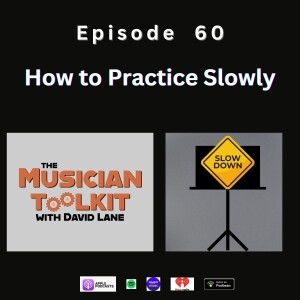
Monday Feb 05, 2024
Monday Feb 05, 2024
If you've had a music teacher at any point in your life, you've probably heard the advice to "slow down". It is truly excellent advice...if you approach it a certain way. If your idea of practicing slowly is to make everything proportionately slower (as if someone filmed you full speed and then put the video in slow motion), this is only one way, and usually not the most effective in most cases. Check out this episode to hear what good slow practice should look like.
Let me know your thoughts on this episode at https://www.speakpipe.com/MusicianToolkit or you can send me a written message at https://www.davidlanemusic.com/contact
You can find this episode and links to this show on all podcast apps from https://musiciantoolkit.podbean.com/. If you enjoyed this, please give it a rating and review on the podcast app of your choice. You can also now find the podcast at https://www.davidlanemusic.com/toolkit
You can follow David Lane AND the Musician Toolkit podcast on Facebook @DavidMLaneMusic, on Instagram and TikTok @DavidLaneMusic, and on YouTube @davidlanemusic1
This episode is sponsored by Fons, an online platform that helps private teachers of all types (music, yoga, martial arts, academic tutoring, coaches, etc) with smooth, automated assistance such as securing timely automatic payments and scheduling. Click here for more information or to begin your free trial.
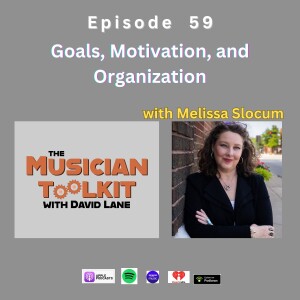
Monday Jan 29, 2024
Monday Jan 29, 2024
Whether you're a teacher or a performing musician, you'll only go as far as your goals, your system for dealing with lack of motivation, and your organization. The guest for this episode is Melissa Slocum - piano teacher, business coach, and podcaster. We talk about a variety of topics in this episode, including better ways to think about goals, a different approach to the idea of work/life balance, the important 1-word question you should regularly ask yourself, 2 nightly routines to keep you organized and motivated, a challenging take on the concept of the "ideal client" and more!
Follow Melissa at https://musicgro.com/
Her podcast, Sounds of Encouragement, can be found on any podcast app or here: https://musicgro.com/podcasts/
Let me know your thoughts on this episode at https://www.speakpipe.com/MusicianToolkit or you can send me a written message at https://www.davidlanemusic.com/contact
You can find this episode and links to this show on all podcast apps from https://musiciantoolkit.podbean.com/. If you enjoyed this, please give it a rating and review on the podcast app of your choice. You can also now find the podcast at https://www.davidlanemusic.com/toolkit
You can follow David Lane AND the Musician Toolkit podcast on Facebook @DavidMLaneMusic, on Instagram and TikTok @DavidLaneMusic, and on YouTube @davidlanemusic1
This episode is sponsored by Fons, an online platform that helps private teachers of all types (music, yoga, martial arts, academic tutoring, coaches, etc) with smooth, automated assistance such as securing timely automatic payments and scheduling. Click here for more information or to begin your free trial.
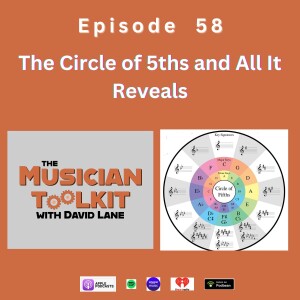
Monday Jan 22, 2024
Monday Jan 22, 2024
No single visual aid shows more aspects of how music works than the Circle of 5ths (sometimes called Circle of Keys and Circle of 4ths). Besides its more widely known uses for showing the order of sharps and flats along with the keys in sharp and flat order, it also shows scale degree frequency, primary and secondary triads, chord groupings, and more. From the basic to the obscure, this will get into the Circle of 5ths and all that it reveals.
Click here for the specific visual referred to throughout this episode: Circle of 5ths Image
What else have you discovered about music because of the circle of 5ths?
Let me know your thoughts on this episode at https://www.speakpipe.com/MusicianToolkit or you can send me a written message at https://www.davidlanemusic.com/contact
You can find this episode and links to this show on all podcast apps from https://musiciantoolkit.podbean.com/ . If you enjoyed this, please give it a rating and review on the podcast app of your choice. You can also now find the podcast at https://www.davidlanemusic.com/toolkit
You can follow David Lane AND the Musician Toolkit podcast on Facebook @DavidMLaneMusic, on Instagram and TikTok @DavidLaneMusic, and on YouTube @davidlanemusic1
This episode is sponsored by Fons, an online platform that helps private teachers of all types (music, yoga, martial arts, academic tutoring, coaches, etc) with smooth, automated assistance such as securing timely automatic payments and scheduling. Click here for more information or to begin your free trial.
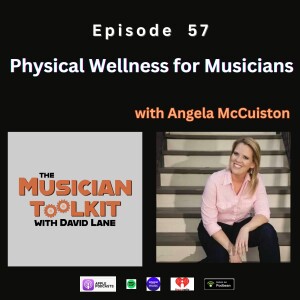
Monday Jan 15, 2024
Monday Jan 15, 2024
So many musicians sit for hours a day, or perform a similar motion repeatedly, or maintain their arms in a fixed position...or some combination of those three, and they lead to injuries or fatigue in more than 90% of musicians at some point in their career. The majority of issues are correctable and even preventable.
The guest for this episode is Angela McCuiston, a personal trainer and founder of MusicStrong, and focuses on helping musicians develop a physical fitness routine to help them play injury-free.
Links mentioned on this episode:
Sign up here for MusicStrong membership.
Become a Founding Member of the Wellness Center.
Facebook group for Music Strong.
Let me know your thoughts on this episode at https://www.speakpipe.com/MusicianToolkit or you can send me a written message at https://www.davidlanemusic.com/contact
You can find this episode and links to this show on all podcast apps from https://musiciantoolkit.podbean.com/ . If you enjoyed this, please give it a rating and review on the podcast app of your choice. You can also now find the podcast at https://www.davidlanemusic.com/toolkit
You can follow David Lane AND the Musician Toolkit podcast on Facebook @DavidMLaneMusic, on Instagram and TikTok @DavidLaneMusic, and on YouTube @davidlanemusic1
This episode is sponsored by Fons, an online platform that helps private teachers of all types (music, yoga, martial arts, academic tutoring, coaches, etc) with smooth, automated assistance such as securing timely automatic payments and scheduling. Click here for more information or to begin your free trial.
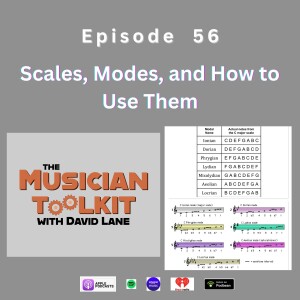
Monday Jan 08, 2024
Monday Jan 08, 2024
Basic classical music education introduces students to a major scale, 3 types of minor scales, and a chromatic scale. If you continue a little deeper, you might get a passing introduction to the modes (such as dorian and phyrigian), the whole tone scale, pentatonic scales, and maybe the diminished scale, not to mention non-Western and even synthetic scales. But how many of these do you really know well in terms of theory? Further still, how many of these scales have you committed to practicing in all keys? This episode will introduce you to all of these scales and hopefully encourage you to really expand the variety of scales you have been learning.
Let me know your thoughts on this episode at https://www.speakpipe.com/MusicianToolkit or you can send me a written message at https://www.davidlanemusic.com/contact
You can find this episode and links to this show on all podcast apps from https://musiciantoolkit.podbean.com/ . If you enjoyed this, please give it a rating and review on the podcast app of your choice. You can also now find the podcast at https://www.davidlanemusic.com/toolkit
You can follow David Lane AND the Musician Toolkit podcast on Facebook @DavidMLaneMusic, on Instagram and TikTok @DavidLaneMusic, and on YouTube @davidlanemusic1
This episode is sponsored by Fons, an online platform that helps private teachers of all types (music, yoga, martial arts, academic tutoring, coaches, etc) with smooth, automated assistance such as securing timely automatic payments and scheduling. Click here for more information or to begin your free trial.
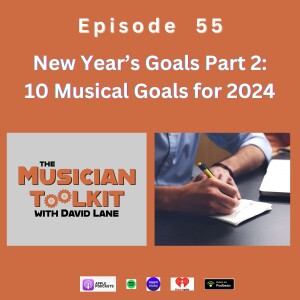
Monday Jan 01, 2024
Monday Jan 01, 2024
On Episode 53, we offered 12 areas you want to consider reducing or eliminating in order to clear room on your slate. This episode follows up to offer 10 specific musical goals that you can add to your own goals in order to become a better more well-rounded musician this upcoming year!
Prior episodes mentioned:
New Year's Goals Part 1: Letting Some Things Go | Ep53
Designing a Website That Works (with Taylor Rossi) | Ep40
Other helpful relevant episodes:
The Benefits of Score Study (with Andrew Callo) | Ep16
Basics of Studio Recording (with Liz May) | Ep26
Let me know your thoughts on this episode at https://www.speakpipe.com/MusicianToolkit or you can send me a written message at https://www.davidlanemusic.com/contact
You can find this episode and links to this show on all podcast apps from https://musiciantoolkit.podbean.com/ . If you enjoyed this, please give it a rating and review on the podcast app of your choice. You can also now find the podcast at https://www.davidlanemusic.com/toolkit
You can follow David Lane AND the Musician Toolkit podcast on Facebook @DavidMLaneMusic, on Instagram and TikTok @DavidLaneMusic, and on YouTube @davidlanemusic1
This episode is sponsored by Fons, an online platform that helps private teachers of all types (music, yoga, martial arts, academic tutoring, coaches, etc) with smooth, automated assistance such as securing timely automatic payments and scheduling. Click here for more information or to begin your free trial.
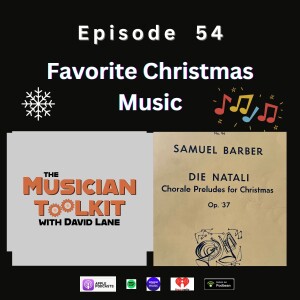
Monday Dec 25, 2023
Monday Dec 25, 2023
Merry Christmas and Happy Holidays to all our listeners! This short episode is an introduction to David's 3 favorite pieces of Christmas music:
Samuel Barber: Die Natali
Benjamin Britten: Ceremony of Carols
Les Brown & His Band of Renown: Nutcracker Suite
*In the episode, Episode 54 is promoted as part 2, but that episode will be a special Christmas episode.
Let me know your thoughts on this episode at https://www.speakpipe.com/MusicianToolkit or you can send me a written message at https://www.davidlanemusic.com/contact
You can find this episode and links to this show on all podcast apps from https://musiciantoolkit.podbean.com/ . If you enjoyed this, please give it a rating and review on the podcast app of your choice. You can also now find the podcast at https://www.davidlanemusic.com/toolkit
You can follow David Lane AND the Musician Toolkit podcast on Facebook @DavidMLaneMusic, on Instagram and TikTok @DavidLaneMusic, and on YouTube @davidlanemusic1
This episode is sponsored by Fons, an online platform that helps private teachers of all types (music, yoga, martial arts, academic tutoring, coaches, etc) with smooth, automated assistance such as securing timely automatic payments and scheduling. Click here for more information or to begin your free trial.
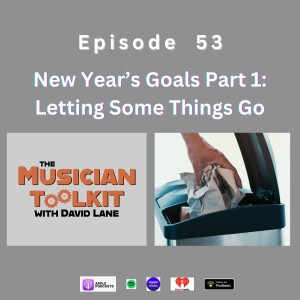
Monday Dec 18, 2023
Monday Dec 18, 2023
This week's episode and next offer some suggestions on New Year's goals. Episode 55* will deal with suggested goals for getting things done or accomplished, but this week's Episode 53 is important to check out first. Before you can really get things accomplished that matter to you the most as a musician, you have to make room in your life by auditing various aspects of your life to see if you can minimize or completely remove some of the things filling up your time and space. This episode offers 12 ways you might consider for removing clutter.
*In the episode, Episode 54 is promoted as part 2, but that episode will be a special Christmas episode.
Let me know your thoughts on this episode at https://www.speakpipe.com/MusicianToolkit or you can send me a written message at https://www.davidlanemusic.com/contact
You can find this episode and links to this show on all podcast apps from https://musiciantoolkit.podbean.com/ . If you enjoyed this, please give it a rating and review on the podcast app of your choice. You can also now find the podcast at https://www.davidlanemusic.com/toolkit
You can follow David Lane AND the Musician Toolkit podcast on Facebook @DavidMLaneMusic, on Instagram and TikTok @DavidLaneMusic, and on YouTube @davidlanemusic1
This episode is sponsored by Fons, an online platform that helps private teachers of all types (music, yoga, martial arts, academic tutoring, coaches, etc) with smooth, automated assistance such as securing timely automatic payments and scheduling. Click here for more information or to begin your free trial.
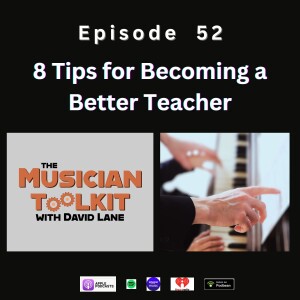
Monday Dec 11, 2023
Monday Dec 11, 2023
David Lane is about to celebrate 24 years of being a private teacher for piano, composition, and theory. He offers 8 tips for becoming a better teacher, some easy-to-apply things that he was not doing from the very beginning, each of which has made him a better and happier teacher.
Let me know your thoughts on this episode at https://www.speakpipe.com/MusicianToolkit or you can send me a written message at https://www.davidlanemusic.com/contact
You can find this episode and links to this show on all podcast apps from https://musiciantoolkit.podbean.com/ . If you enjoyed this, please give it a rating and review on the podcast app of your choice. You can also now find the podcast at https://www.davidlanemusic.com/toolkit
You can follow David Lane AND the Musician Toolkit podcast on Facebook @DavidMLaneMusic, on Instagram and TikTok @DavidLaneMusic, and on YouTube @davidlanemusic1
This episode is sponsored by Fons, an online platform that helps private teachers of all types (music, yoga, martial arts, academic tutoring, coaches, etc) with smooth, automated assistance such as securing timely automatic payments and scheduling. Click here for more information or to begin your free trial.

Thank you for listening!
If you would like to help financially support this podcast, we gratefully accept donations of any amount through this link.
Your donation can be one-time or renew monthly. Thanks so much for your support!
You can also leave a voice message for possible inclusion on an episode at https://www.speakpipe.com/MusicianToolkit . Please leave at least your first name and what your message is regarding. Also feel free to say something about yourself if you're a musician and/or a teacher.









